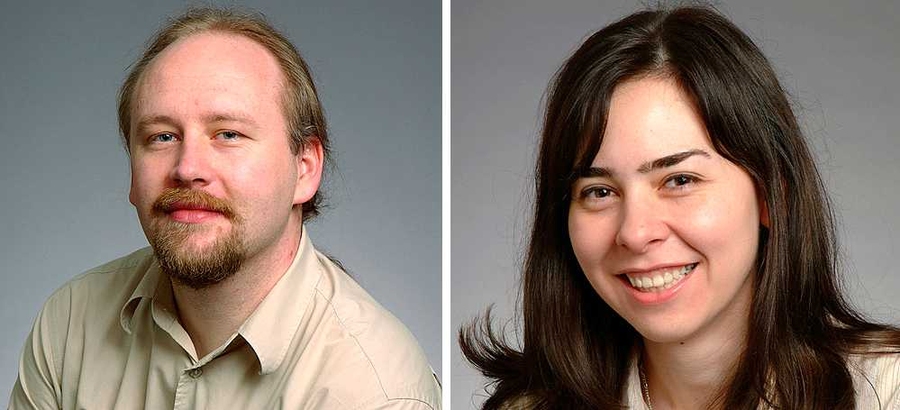The Association for Computing Machinery (ACM) has announced that it is honoring Professor Piotr Indyk and Professor Dina Katabi for their innovations in computing technology. Indyk has been named one of the recipients of the Paris Kanellakis Theory and Practice Award, which honors specific theoretical accomplishments that have had a significant and demonstrable effect on the practice of computing. Katabi has been honored as one of the recipients of the Grace Murray Hopper Award, which recognizes the outstanding young computer professionals of the year. According to the ACM, "These innovators have made significant contributions that enable computer science to solve real world challenges."
Indyk was honored along with Andrei Broder and Moses Charikar with the 2012 Paris Kanellakis Theory and Practice Award for algorithms that allow for quickly finding similar entries in large databases, known as locality-sensitive hashing (LSH). These algorithms can drastically reduce the computational time needed for retrieving similar items, at the cost of a small probability of failing to find the absolute closest match.LSH has impacted fields as diverse as computer vision, databases, information retrieval, data mining, machine learning and signal processing.
Indyk, along with the late Rajeev Motwani, extended LSH functions to a wider range of distance functions, and applied them to design efficient approximate nearest neighbor algorithms. Indyk is a principal investigator at the MIT Computer Science and Artificial Intelligence Lab (CSAIL), a member of the Theory of Computation Group at CSAIL, and a professor in the MIT Department of Electrical Engineering and Computer Science.
Katabi and Martin Casado are the 2012 recipients of the Grace Murray Hopper Award for advances in network efficiency. Katabi initiated a new approach to network design using an Explicit Control Protocol (XCP) that minimizes network congestion and maximizes utilization efficiency. Her research addressed a strategic technological problem of Internet growth, which requires extreme scalability and robustness. She developed XCP, an algorithm to ensure fair allocation of capacity among different flows that compete for the same Internet bandwidth. Her scheme is the first protocol to achieve both goals simultaneously without imposing excessive per-flow overhead on Internet routers.The design separated the efficiency and fairness policies of congestion control, which delivered the highest possible application performance over a broad range of network infrastructure.
Katabi is a principal investigator at CSAIL, co-director of the MIT Center for Wireless Networks and Mobile Computing (Wireless@MIT), a professor in the MIT Department of Electrical Engineering and Computer Science and leader of the Networks@MIT research group at CSAIL.
ACM will present these and other awards at the ACM Awards Banquet on June 15 in San Francisco, Calif.
Indyk was honored along with Andrei Broder and Moses Charikar with the 2012 Paris Kanellakis Theory and Practice Award for algorithms that allow for quickly finding similar entries in large databases, known as locality-sensitive hashing (LSH). These algorithms can drastically reduce the computational time needed for retrieving similar items, at the cost of a small probability of failing to find the absolute closest match.LSH has impacted fields as diverse as computer vision, databases, information retrieval, data mining, machine learning and signal processing.
Indyk, along with the late Rajeev Motwani, extended LSH functions to a wider range of distance functions, and applied them to design efficient approximate nearest neighbor algorithms. Indyk is a principal investigator at the MIT Computer Science and Artificial Intelligence Lab (CSAIL), a member of the Theory of Computation Group at CSAIL, and a professor in the MIT Department of Electrical Engineering and Computer Science.
Katabi and Martin Casado are the 2012 recipients of the Grace Murray Hopper Award for advances in network efficiency. Katabi initiated a new approach to network design using an Explicit Control Protocol (XCP) that minimizes network congestion and maximizes utilization efficiency. Her research addressed a strategic technological problem of Internet growth, which requires extreme scalability and robustness. She developed XCP, an algorithm to ensure fair allocation of capacity among different flows that compete for the same Internet bandwidth. Her scheme is the first protocol to achieve both goals simultaneously without imposing excessive per-flow overhead on Internet routers.The design separated the efficiency and fairness policies of congestion control, which delivered the highest possible application performance over a broad range of network infrastructure.
Katabi is a principal investigator at CSAIL, co-director of the MIT Center for Wireless Networks and Mobile Computing (Wireless@MIT), a professor in the MIT Department of Electrical Engineering and Computer Science and leader of the Networks@MIT research group at CSAIL.
ACM will present these and other awards at the ACM Awards Banquet on June 15 in San Francisco, Calif.






